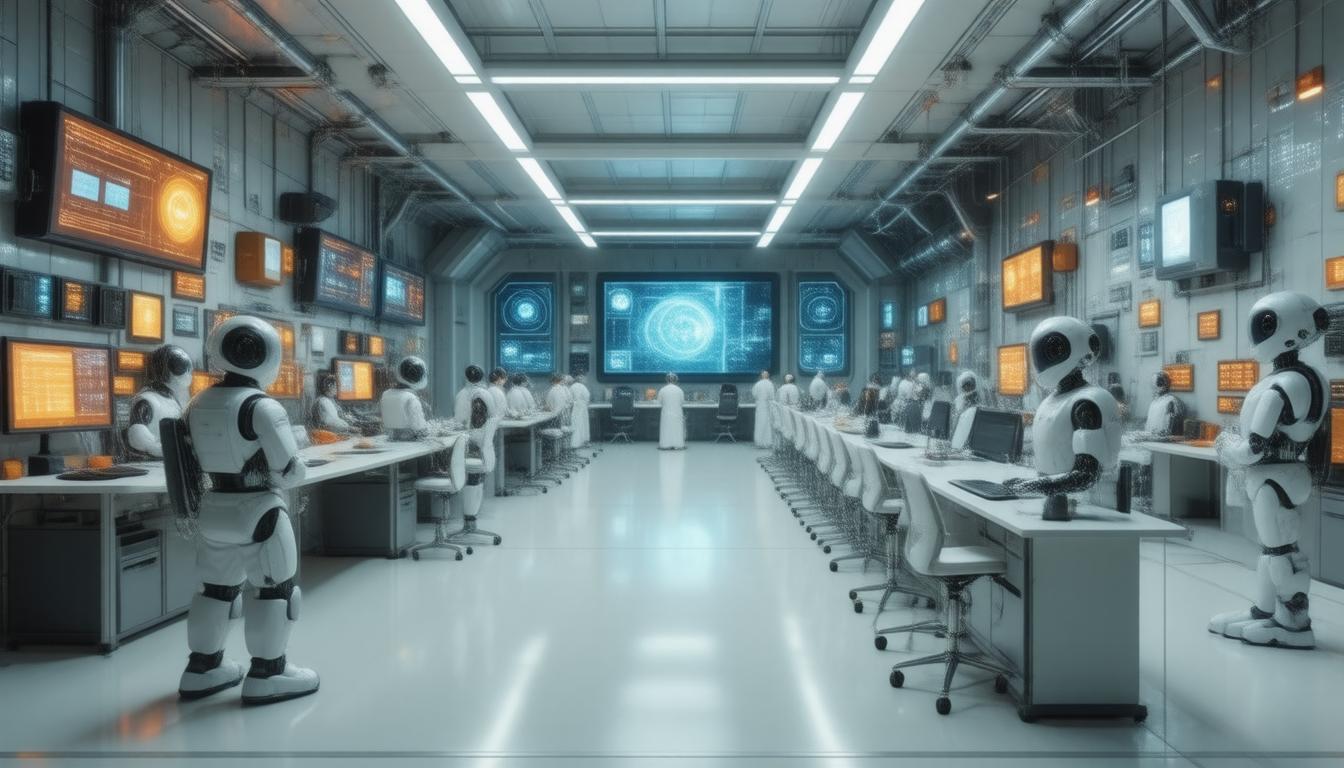In recent years, AI innovations have transformed various sectors, heralding a new era of efficiency and intelligence in the workplace. These advancements are not just enhancing existing processes but are also redefining the very nature of work and automation itself. From smart task management systems to advanced data analysis tools, organizations are increasingly reliant on AI to drive performance and innovation. In this article, we delve into the key AI innovations that are reshaping workplaces, examine their impact on efficiency, and explore the challenges and opportunities they present for the future.
Key Takeaways
- AI innovations are transforming traditional work environments and enhancing operational efficiency.
- Automation is streamlining task management and workflows, reducing manual labor and error rates.
- AI-driven decision making allows for more accurate data analysis and informed business strategies.
- Implementing AI comes with challenges such as data privacy, ethical considerations, and workforce adaptation.
- The future of work will increasingly rely on AI and automation, reshaping job roles and creating new opportunities.
Introduction to AI Innovations
In today’s rapidly evolving technological landscape, AI innovations that are redefining the future of work and automation are at the forefront of reshaping industries and enhancing productivity. These innovations are not just incremental improvements; they represent a significant shift in how businesses operate. From intelligent automation that streamlines processes to machine learning algorithms that provide predictive insights, AI technologies are enabling organizations to optimize their workflows, reduce costs, and improve decision-making. As AI continues to advance, professionals across various sectors must adapt to these changes, embracing new tools that can augment their skills and foster greater collaboration. Understanding these transformative AI innovations is crucial for anyone looking to thrive in the future work environment.
The Impact of AI on Workplace Efficiency
In today’s rapidly advancing technological landscape, AI innovations that are redefining the future of work and automation are transforming how businesses operate and interact with their workforce. Companies are increasingly leveraging artificial intelligence not just to enhance productivity, but also to create a more dynamic and adaptable work environment. By automating routine tasks such as data entry and scheduling, AI frees up employees to focus on more strategic initiatives. Moreover, advanced analytics powered by AI can provide insights into employee performance and project management, enabling teams to optimize their workflow and decision-making processes. As we embrace these innovations, it’s essential for organizations to integrate AI thoughtfully, ensuring they invest in training and development that empowers employees to harness these tools effectively. The result is a workforce that is not only efficient but also more engaged and innovative, poised to tackle the challenges of tomorrow.
‘The real work of the future is to ensure that the technology we put in place serves humanity, not the other way around.’ – Ginni Rometty
Automation in Task Management and Workflow
In today’s fast-paced business environment, AI innovations that are redefining the future of work and automation are revolutionizing task management and workflow processes. These advanced technologies streamline operations by automating routine tasks, enabling teams to focus on strategic initiatives rather than mundane activities. For instance, AI-powered tools can categorize emails, schedule meetings, and generate reports with remarkable accuracy, significantly reducing the time spent on administrative responsibilities. Furthermore, integrating these innovations into existing systems fosters collaboration by offering real-time insights and data analysis that help in decision-making. As organizations increasingly adopt AI-driven solutions, they not only enhance productivity but also position themselves as leaders in their industry, ensuring they remain competitive in a landscape that demands efficiency and adaptability.
AI-driven Decision Making and Data Analysis
In recent years, AI innovations that are redefining the future of work and automation have become increasingly pivotal, particularly in the realms of decision-making and data analysis. Businesses are harnessing the power of artificial intelligence to streamline operations, enhance productivity, and derive actionable insights from vast amounts of data at unprecedented speeds. AI-driven decision-making systems not only process real-time information but also learn from historical data, allowing organizations to make informed choices that are more strategic and timely. For instance, machine learning algorithms can analyze patterns in consumer behavior, providing companies with valuable predictions that aid in marketing and inventory management. As these innovations advance, they are reshaping traditional workflows, enabling teams to focus on more complex tasks that require creative and critical thinking, thus transforming the overall dynamics of the workplace and heralding a new era of automation.
Challenges and Considerations in AI Implementation
As organizations increasingly adopt AI innovations that are redefining the future of work and automation, they face a myriad of challenges and considerations that can significantly influence their success. One of the primary obstacles is the integration of AI systems into existing workflows, which often requires substantial changes in processes and employee roles. These changes can lead to resistance from staff, necessitating effective change management strategies to ease transitions. Additionally, companies must consider the ethical implications of AI deployments, ensuring transparency and fairness in algorithms to avoid bias and safeguard employee trust. Cybersecurity is another critical factor, as the incorporation of advanced AI technologies may create vulnerabilities that need to be meticulously managed. Furthermore, organizations need to invest in continuous learning and upskilling programs for their workforce to adapt to new technologies effectively. Balancing these challenges while harnessing the potential of AI innovations that are redefining the future of work and automation will be essential for businesses aiming to thrive in this rapidly evolving landscape.
The Future Landscape: What Lies Ahead for Work and Automation
As we stand on the brink of a new era characterized by AI innovations that are redefining the future of work and automation, it is clear that the traditional workplace is evolving at an unprecedented pace. From smart algorithms capable of analyzing vast amounts of data to automated systems that handle mundane tasks, these technologies are not only enhancing productivity but also reshaping job roles and responsibilities. Companies are beginning to embrace AI-driven tools to streamline operations, allowing employees to focus on more strategic aspects of their roles. As automation continues to advance, workers must adapt and reskill, ensuring they remain valuable in a landscape where AI is a key player. Looking ahead, it is essential for organizations to foster a collaborative relationship between humans and machines, creating a work environment that leverages AI innovations while nurturing human creativity and problem-solving skills. The future of work is not just about replacing jobs; it’s about enhancing them through intelligent automation, thereby paving the way for a more efficient and innovative workforce.
Frequently Asked Questions
What are some examples of AI innovations in the workplace?
Examples of AI innovations in the workplace include intelligent virtual assistants, AI-powered project management tools, predictive analytics for decision making, and machine learning algorithms that optimize workflows.
How does AI improve workplace efficiency?
AI improves workplace efficiency by automating repetitive tasks, providing insights through data analysis, streamlining communication, and enhancing productivity through advanced scheduling and resource allocation.
What challenges might organizations face when implementing AI in their workflows?
Organizations may face challenges such as data privacy concerns, resistance to change from employees, the need for upskilling staff to work alongside AI, and ensuring the reliability and accuracy of AI systems.
What role does AI play in decision making?
AI plays a significant role in decision making by analyzing large datasets to identify trends, providing predictive insights, and offering recommendations that help employees make informed choices quickly and effectively.
What does the future hold for AI and automation in the workplace?
The future of AI and automation in the workplace is expected to involve more sophisticated AI tools that enhance human capabilities, greater collaboration between humans and machines, and an evolving skill set that will prioritize creativity and adaptability.




